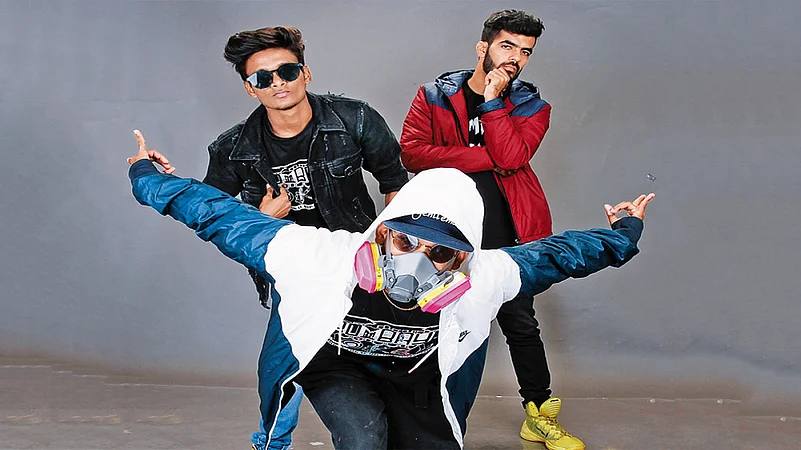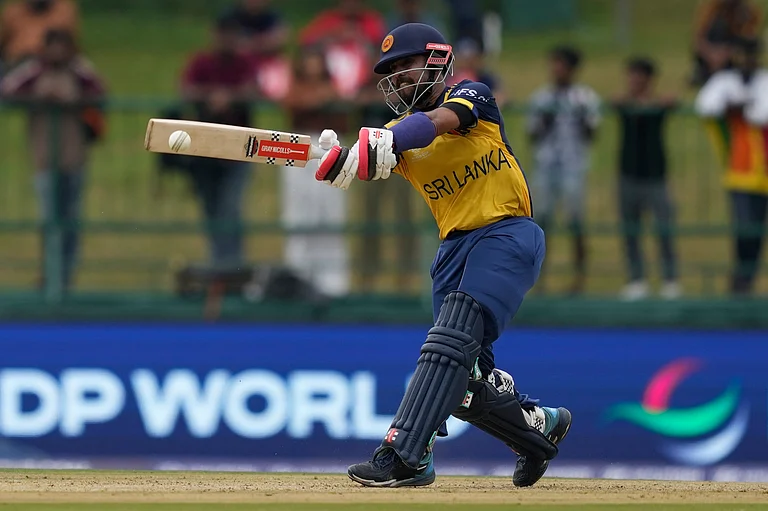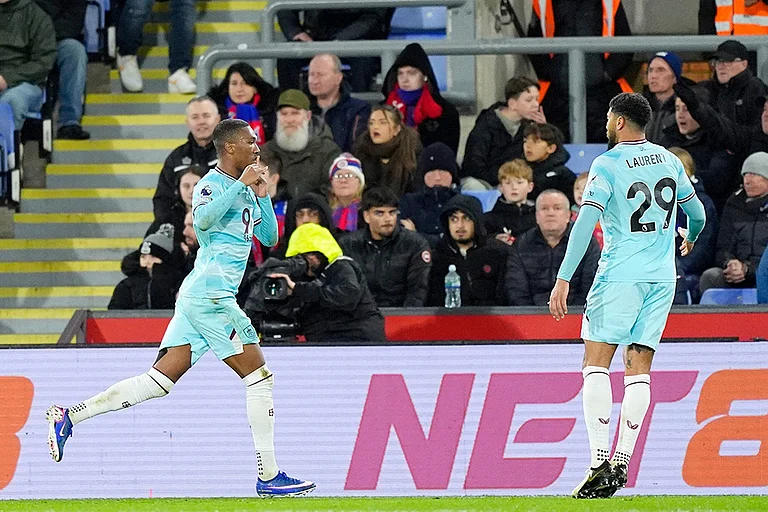A lot of people ask me, when and how I got into hip-hop? Well, I had a different answer to it earlier, when I would refer to the time I started composing music or writing rhymes around 2008. But now, 14 years as a full-time rap artiste going by the name of ‘Shaikhspeare’, my answer is different. I was into it way back in my teens, being a rebel at heart without knowing what hip-hop was. I say this because hip-hop is more than just a music genre. It’s a culture, a way of life, an expression of self, a language for rebels.
KRS-ONE, a pioneer of hip-hop culture who also goes by the name ‘Teacha’, once said that hip-hop exists since pre-historic times. “Hip-hop has existed from the time human species wanted to express themselves through paintings on caves, which took an urban shape in the form of graffiti on the walls, vocal sounds took the form of beatboxing or rap to express the thoughts, and ritualistic dancing took form of breaking, also known as b-boying”. All these elements had one thing in common—expression of self and rebellion. And I could not relate more to KRS-ONE.
It is even more fascinating for me to understand how I found hip-hop and my truest self at a distant place far from where I come from—a middle-class family in a small village in Bhagalpur, Bihar. I was an introvert kid during my school days, more into books than arts or music. I was fascinated by the human body, biology and literature. Listening to music was my hobby and I grew up with compositions and songs of Kishore Kumar and Mohd. Rafi and 90’s Bollywood songs. Although most of my family members were practising Muslims, they were easy on us when it came to music. My Nana (maternal grandfather), who is a doctor, used to write naat (religious poetry) himself. My inclination towards literature, poetry and the knowledge I received in school definitely shaped the artist I’m today. Those days, I was I starting to question everything around me, mostly religious and societal prejudice, but I had no medium to express it. While I was in school, my dad had already migrated to Mumbai in search of better job opportunities.
And so, after my 10th board examination, I arrived in Mumbai for the next chapter of my life, probably pursue my teenage dream of being a doctor. I was taken aback by the hustle and bustle of the big city, but the culture shock was even greater—a teeming metropolis with its own Bambaiya lingo; where else does the humble potato, aloo, goes by the term batata? But college began, I could finally get accustomed to my new surroundings. Coming from an English-medium school , I was much receptive to English songs and it became a hobby to check more of music and pop songs that used to play on music channels such as MTV.
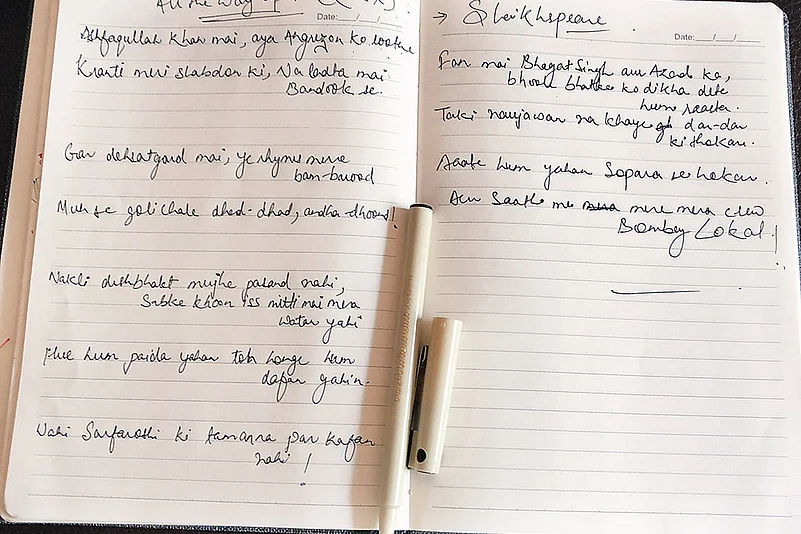
By that time, I had heard a rap song, Loose yourself, by Eminem and was instantly intrigued by the energy, the lyrics, and was fascinated by the way he expressed himself. I felt that this could be a great way for me as well to express myself. In my junior college years, I had classmates who had similar interests in rap music as well, and they gave me a CD with songs by artistes like 50 Cent and Snoop Dogg. From there on, things started rolling as I was researching more about hip-hop, exploring more artistes, going to cyber cafes to print out their lyrics and memorise them in order to rap along. During that time, I came across another artiste who became major catalyst in my journey to become a conscious, socially and politically aware hip-hop artist. It was none other than Tupac Shakur, a poet and philosopher, who is till date my favourite rap artiste. The first track I heard of him was a song titled Changes, released after he was shot dead at the age of 25 in September 1996: I see no changes, wake up in the morning and I ask myself/Is life worth livin’? Should I blast myself ?/I’m tired of bein’ poor and, even worse, I’m Black/My stomach hurts so I’m lookin’ for a purse to snatch. The brutally honest depiction of Black lives in the US had me thinking about of my own country and society, with its own flaws like fascism, communalism, casteism and Islamophobia. My knowledge about world politics increased more as I explored socio-political artistes and groups like Dead Prez, NWA, Immortal Technique, Lowkey and Vinnie Paz.
ALSO READ: Songs Of Freedom & Redemption
Between 2012-2015, I was learning and honing my skills with cyphers, where a bunch of hip-hop heads used to gather in a park and sit in a circle, reciting rhymes one by one. Moving on to being a battle rapper and getting recognised for making socio-political and conscious tracks, I was slowly building my place in the hip-hop community and the city that inspired me. The densely-populated Nalasopara, where I was residing then, is home to migrants who have come to Mumbai to make a living. I saw their daily struggle—from rushing to work no matter the weather and even putting their lives at risk on packed local trains just to reach workplaces on time. I even saw horrific accidents when people fell off local trains deemed the lifeline of Mumbai. Regardless, I never saw the city stop until the pandemic took over. Nalasopara only inspired to me keep going and I became better at facing hardships. Achievements came along the way. My crew was featured in some reputed print media and entertainment platforms such as BBC Asian network, followed by our appearance in the hit movie, Gully Boy, movie and winning the Mumbai achiever’s award in 2019 as the best hip-hop collective.
Amid the achievements, the core artiste in me now had a better understanding of politics and propaganda, could draw similarities between authoritarian regimes internationally and in my own country. Minorities or any other dissenting voice faced extreme backlash, both online and in the real world. Horrific incidents like the lynching of Akhlaq over suspicion of beef consumption, the murder of Gauri Lankesh for being a vocal critic, and oppression of JNU students for dissenting against atrocities, left me appalled and enraged. My song called Inquilab Zindabad highlighted these incidents and asked for unification against fascist forces. I faced backlash online from right-wingers. But at the same time, I was also appreciated by citizens who believed in speaking the truth and bringing a positive change.
ALSO READ: Wu-Tang Manual For Indie Homies
However, over the years , my own choices have changed as an artiste as I have to balance my content in order to survive economically. I’m not making too much of politically-charged songs as the environment around doesn’t seem safe enough for artistes with strong political views, especially if they come from a minority group. My intention and approach are still the same, though, and knowing that we have a larger audience to cater to, it has to be served in a way that the message gets across without bringing unwanted drama.
I am much moved by one quote of Shaheed Bhagat Singh, “If the deaf are to hear, then the sound has to be very loud”, and to me hip-hop is that loud sound. It has taught me to never keep my voice down and it is the same reason that I’m naturally still vocal about the socio-political status quo. The NRC-CAA protests, the Shaheen Bagh movement, followed by the farmers’ protest made me and my mates write songs to be in solidarity with the people fighting against injustice and inequality. I recently released a collaborative song in support of the farmers:
ALSO READ: Clash Of Cultures In Smalltown Bihar
Karta fly, mai ‘udta’ high
Punjab jaisa, par ghar basaye
Kisan jaisa jo hal chalaye
Wo phal ugaye kyu dhan na paye
Hum haq jataye, na lad-khadaye
Kabhi thak na paye, ye dabdaba hai
Sach hai bola, na kapkapaye
Sangeet dil se, ye dhak-dhakeye.
(I fly, soar high
Like Punjab, but with a home of mine
Like the farmer who ploughs his land thereby
Grows fruits but of his money is deprived
We claim our rights, we are not tongue-tied
We don’t tire, you can ask around
We speak the truth, we aren’t petrified
Music from the heart, it electrifies)
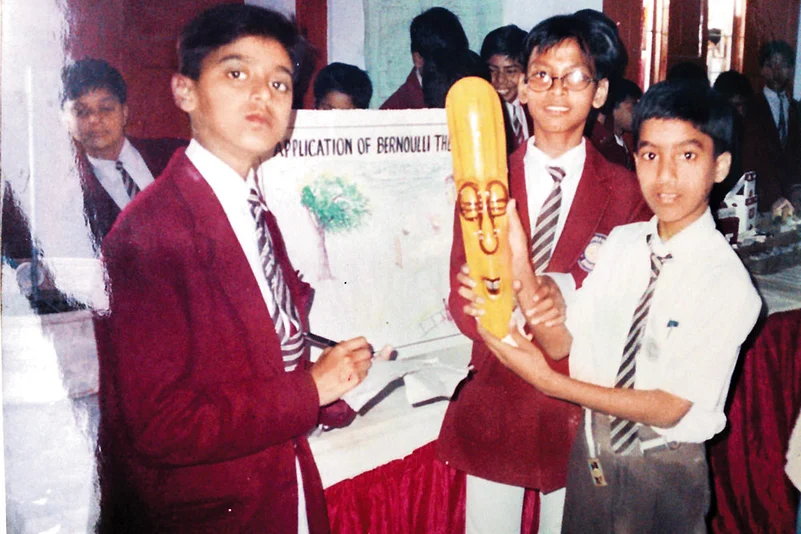
Young and restless The author (in glasses) as a schoolboy.
I emphasise more on hip-hop being a common language for rebels, regardless of their religion, caste and the class and there is a reason for that. You don’t have to be from a certain community or religion to be vocal against fascism. Gravity, a crew mate and co-founder of ‘Bombay Lokal’ , wrote a song titled Akrosh, which was about the administrative failure during the pandemic, leading to immense suffering for the common man. Besides political issues, hip-hop artistes have also been raising burning social subjects. 24-year-old Farhan Khan of ‘Lokal Gang’, an extension of Bombay Lokal, penned a hard-hitting song Comedy Show:
71 saal hue azaadi ko par tum naari ho tum naa azaadi lo
Beti kaali tho usko gaali do uski wajah se dahej bhade shaadi ko
Maaro tum naari ko zinda jala daalo
Ander ke ango ko jadd se hila dalo
Jo naa wo mane tho usko azaab do
Muh ko bigad do ye lo tezaab lo.
(71 years since freedom but you’re woman you’re not entitled to
If your daughter’s dark, curse her, she’ll raise the dowry too
Beat the woman black-and-blue burn her to the tissue
Shake her innards by their roots
If she doesn’t comply torture her anew
Disfigure her face take his acid thank you)
Another Lokal Gang member Y-ash’s spoke as much in his track Kranti:
Kya manga desh ne?
Shanti shukh...
Tum beche airports hum rahe fir bhi chup!
Fir tum ne beche railways...
Fir bhi chup
Kisaan khaaye laathi ab naa sunega ye youth.
(What did the nation want?
Peace and succour
You sold the airport we quietly endured
Then you sold railways...
And we quietly endured
Farmers rained with baton, now youth will speak up for sure)
ALSO READ: Hip-Hop Found A Connect In Pain Of Kashmiris
These songs are just examples of what we hip-hop artistes are always vocal about. Some also express their own personal issues and find a way to get some weight off their chests. Such a self-expressive song comes from 19-year-old singer of Lokal Gang who goes by the name of The Poet Muse. Her song, 25th December, addresses her father for not being there during her childhood and teenage years.
Hip-hop as a culture is not just limited to expression through rap. But all its other elements have a tone of self-expression. Bombay Lokal consists of beatboxers, rappers, graffiti writers and b-boy as a collective with all elements of hip-hop and each element has its own way of expression. Some express themselves through raps, some through bodily movements, some through spray cans and some through beat-boxing. The beatboxers from our crew ‘D-cypher’ and ‘Beat Raw’ have brought beatboxing into the limelight with their songs featured in Gully Boy.
From the birth of traditional hip-hop in south Bronx in 1973 with a block party by DJ Kool Herc, to becoming a global phenomenon, hip-hop has come a long way and has become a widespread culture due to its rebellious core. Any place or community that has needed a tool for resistance has adopted it and has given their own flavour to it. From being a strong tool for the Black community resisting against their oppressors, battling racism and police brutality, to giving voice to the people of Palestine, Kashmir, to the slums and suburbs of Mumbai, hip-hop is indeed a powerful tool for expression, rebellion and resistance.
While hip-hop has a dark side, which is more commercialised, misogynistic and exploitive to the youth, we cannot deny the fact that the genre has empowered so many youth and given youngsters like me a purpose in life—to speak, motivate, inspire, empower, unite and to build a thriving community of artistes that want to be either heard, entertain or bring about a positive change around them. Hip-hop is a powerful weapon. And in the right hand, it can bring about a positive change. So, we as hip-hop artistes and enthusiasts are ensuring that the tool is used rightly. We mean to use it for the purpose it was meant to be used for.
(This appeared in the print edition as "Rap and Rebellion")
(Views expressed are personal)
Aamir Shaikh is a rapper-lyricist and founder of hip-hop collective Bombay Lokal






